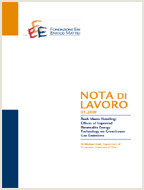Leadership and International Climate Cooperation

02.11.2013
Gregor Schwerhoff
H41, O33, Q54
Climate Change, Leadership, Public Good Provision
Climate Change and Sustainable Development
Carlo Carraro
Which kind of reaction can a nation or group of nations expect when leading by example in climate policy? This literature survey describes possible positive reaction mechanisms from different fields of economics, some of which have scarcely been linked to climate economics previously. One effect may be behavioral, a reaction motivated by fairness, reciprocity or norms. Second, other nations may interpret the leader’s action as a signal on his preference or the value of the objective and adjust their own policy based on the new information. Third, the leader may provide a service to other nations, which decreases their costs and risks. The followers could benefit by learning successful policies, adopting technologies and obtaining information on the cost of environmental policy. In addition to these economic mechanisms, a leading group of nations might initiate a political process of successive enlargements.
***
Suggested citation: Schwerhoff, G., ‘Leadership and International Climate Cooperation’, (2013), Nota di Lavoro 97.2013, Milan, Italy: Fondazione Eni Enrico Mattei.
